
You are reading:

You are reading:
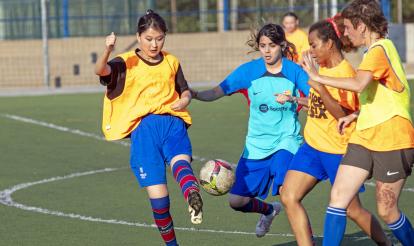
20.08.25
7 minutes readThe Ramassà Sports Association promotes the social inclusion of refugee and asylum-seeking women through a football team whose support network extends far beyond the pitch. The project, supported by the 2024 Catalonia Call for Social Projects by the ”la Caixa” Foundation, aims to help them integrate into the local community.
Viktoriia Blinova is Russian and has been living in Catalonia as a refugee for two years. “I was in a difficult situation in my country because I’m LGBTI+, and right now in Russia there are many problems for people in this community, with laws against us,” she explains.
“Now I’m really happy here,” she adds. Viktoriia shares her story at the sports facilities of the Universitat de Barcelona, where she trains every Monday with a women’s football team. It’s all part of a project run by the Ramassà Sports Association, which aims to support the social integration of refugee and asylum-seeking women through sport and physical activity.
For Viktoriia, being part of the team has been a transformative experience. “At the first training session I was very shy and didn’t want to speak to anyone because I didn’t know Spanish or Catalan, and I’d never played football before. But with each day I became more and more outgoing. Now, when I come to training, I can forget about my problems with paperwork, family, the news and everything else,” she says. And she has no doubt about how much it has helped her: “For me, it’s been like mental and physical therapy.”
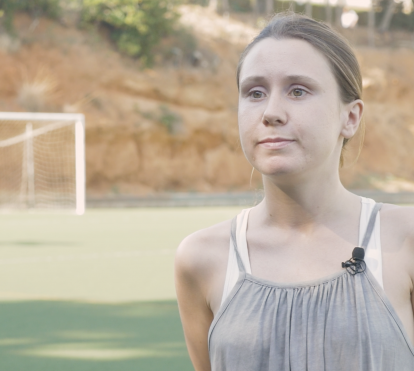
Her teammates are much more than just teammates to her. “The girls from Ramassà are my favourite friends here: a big family made up of cultures from all over the world,” says Viktoriia. Spending time with people who have lived through similar experiences has brought her comfort: “Talking and spending time with them really helped me see that I’m not alone here. I feel very proud and grateful to be part of this team.”
The project began in 2021. Jordi Grivé, president of Ramassà, explains that the initiative emerged after years of experience in solidarity trips and cooperation work in Africa. “We’d been thinking for some time about doing something here in Catalonia as well,” he says. They already had refugee players in the men’s team, referred by social organisations, and decided to launch a women’s version too.
L’objectiu és clar: «Que puguin estar tranquil·les jugant a futbol i que tinguin un suport absolut per poder desconnectar de les seves dificultats i reforçar-se en tots els aspectes: anímic, de salut…», precisa Grivé. Per aconseguir-ho, col·laboren amb entitats com ACNUR, CEAR, Fundació Apip-Acam, Creu Roja, ACATHI, Accem i Sicar.cat, que els deriven a les persones interessades.
The initiative, supported by the ”la Caixa” Foundation through the 2024 Catalonia Call for Social Projects, uses sport as a “tool for social inclusion” that helps “build networks”, explains the team’s coach, María Linares. “The migration process is very complicated. It’s hard to arrive in a new place without knowing the language or having any support network. Playing football is just the excuse; the most important thing is to create networks that make the migration process easier,” she says. She adds: “They don’t just play and build bonds on the pitch, they also meet up outside of football and support one another.”
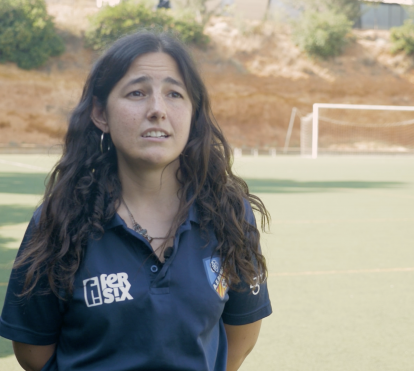
In the 2024-2025 season, the team has been made up of 35 women aged between 18 and 42, from countries including Argentina, Russia, Afghanistan, Pakistan, Haiti, Honduras, Nigeria, Ukraine and Peru. Some fled due to armed conflict; others because they belong to the LGBTI+ community, or because of violence or direct threats to their physical safety.
Shagufa Ebrahimi, another of the players, is 19 years old and has been living in Barcelona for two years. She fled during the war in Afghanistan as a teenager and spent two years as a refugee in Pakistan before seeking asylum in Spain. “By talking with the girls and playing football, I’ve learned so much. It’s helped me become a far more active and energetic person, and I’m really grateful for that,” she says.
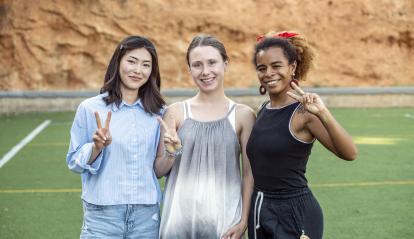
Shagufa confirms that her relationship with her teammates goes beyond training sessions: “At Ramassà we don’t just play football, we also take part in cultural activities, go to museums together… It’s amazing for me to have the friends I have here.” That’s why she encourages others in similar situations to sign up for activities like this: “If they love football or another sport, they should go for it and never give up.”
In addition to training, the project also promotes cultural and recreational activities that help the women feel part of the host society, along with courses designed to support their entry into the job market. “It’s a group that faces a lot of barriers when it comes to finding work,” Linares acknowledges.
The president of the association also hopes this experience can serve as a model: “We want it to be an example for other organisations that are beginning to explore similar projects.” He also expresses his wish for the team to grow: “That more girls will want to join, and that it always remains an open door for new people.”
For Grivé, the project’s impact goes far beyond sport: “There are times when we don’t manage to score goals, but you leave the pitch knowing that, even if you don’t score, you win by building a team, by weaving networks,” he reflects.
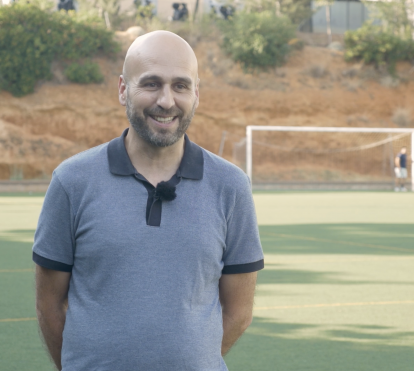
Many of the participants had never played football before. Linares emphasises that “this is a team for everyone” where “there’s a real sense of community.” “The girls who are more experienced help those who aren’t, and that’s what makes the team grow,” she explains.
Although, due to administrative reasons, they cannot compete in official tournaments, every training session ends with a friendly kickabout and a friendly match with another team is organised once a month. “This helps them build team cohesion and motivates them to keep coming; they also enjoy that competitive element too,” the coach reflects.
For the association, working with a gender perspective is essential, and that means taking into account certain needs of the players that may affect their ability to take part in the project. That is why they offer a childcare service during training sessions for those team members who are mothers. “Very often, migrant women travel alone with their children, and without this service they wouldn’t be able to attend training,” explains Linares.
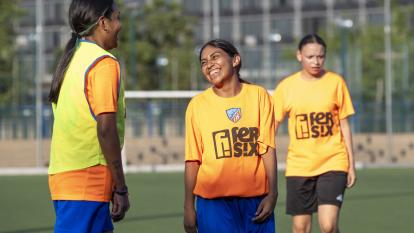
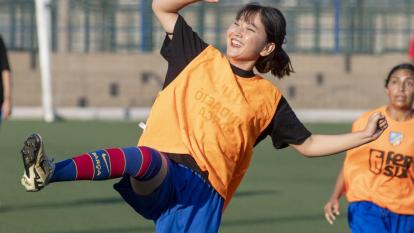
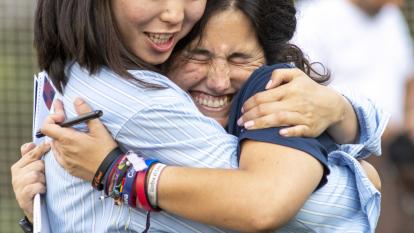
The main goal this season has been to create “alliances and a safe space for everyone; somewhere they could come and express themselves freely during training sessions,” says the coach. And she proudly acknowledges that together, they’ve achieved it. Linares, who will not be continuing next season, says her goodbyes with satisfaction: “I’m very happy that this family has been created.”
Ruby Cuervo, a Colombian nurse, also found much more than just teammates in the group. She fled her country and arrived in Spain alone. “The process was very tough for me, and I was on my own,” she recalls. She used to play sports on her own, but when she was offered the chance to join the project, she accepted, and has no regrets: “Personally, I’ve grown from zero to a thousand. It’s helped me regain my confidence, reconnect socially and feel I’m part of something again. Joining the Ramassà team was the best decision I could have made.”
“Here, I’m part of a family that’s there for you,” says Ruby gratefully. “Whatever we need, we write in the group chat and someone always offers a solution or support,” she adds.
After the summer break, the team will return to training on 15 September. These are women who have been through extreme situations and who, thanks to football, have woven a support network. And they will be back on the pitch to continue building their new lives.